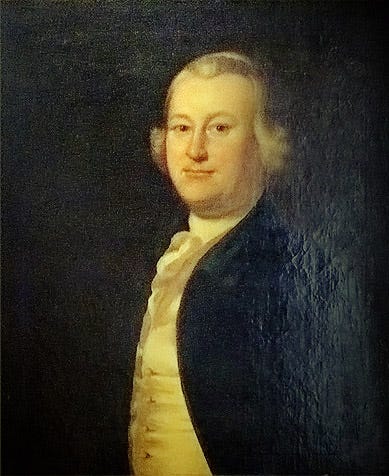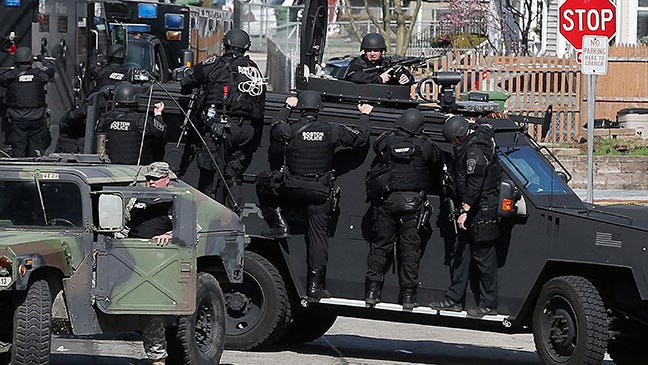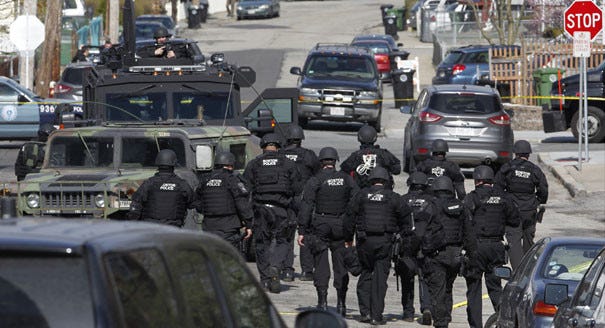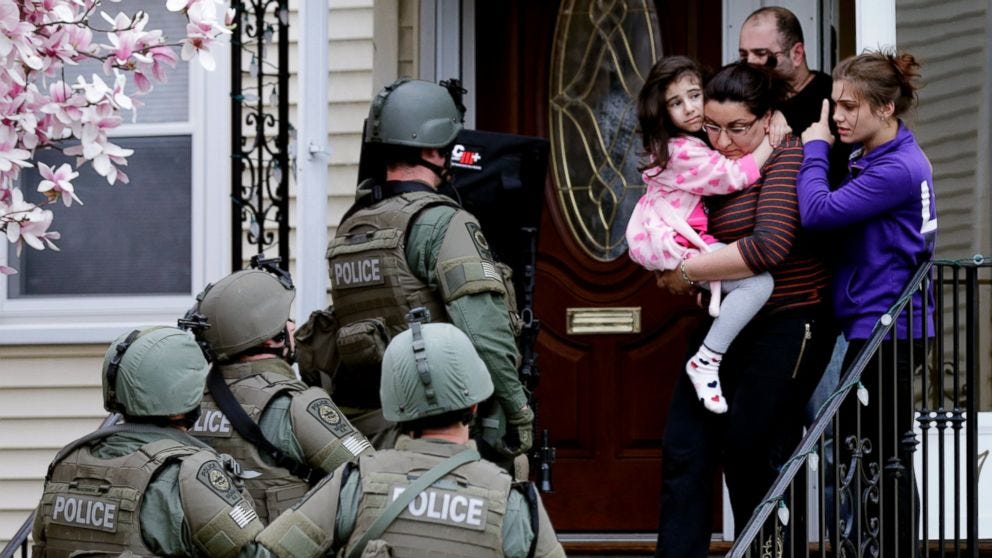Founders History: James Otis Jr, Forgotten Founding Grandfather
James Otis, Mentor To John and Samuel Adams, Laid Out The Argument for The Fourth Amendment
I have never known a man whose love of country was more ardent or sincere, never one who suffered so much, never one whose service for any 10 years of his life were so important and essential to the cause of his country, as those of Mr. Otis from 1760 to 1770
John Adams
This month of February is the birth month of yet another very influential figure who I just learned of, and I suspect you may not be aware of his impact and importance to the American Revolution, the Founding Fathers, and the US Constitution. I call him a Founding Grandfather because without his direct influence on John and Samuel Adams, they may not have had the impact that they did when steering the American independence. And without his public defense of Massachusetts colonial rights, we would not have had the concise and firm foundation for the Fourth Amendment. And as we will see, February is arguably also the month where the legal thesis for American Independence was formulated.
That figure is James Otis, Jr, born on February 5, 1725. Given how much praise both Adams brothers had for Otis, I am going to be so bold as to say he was the Obi-Wan Kenobi to John and Sam’s Luke Skywalker and Han Solo.
There is great irony to Otis’ story. In 1761 in Boston, Otis delivered a legal treatise against Parliament's Writ of Assistance in defense of the colonists’ right as British citizens. British citizens were not subject to warrantless search and seizure, yet the colonists were denied that same right. His five hour defense provided many of the phrases adopted by Adams which later became our Fourth amendment. Before I started this essay, I started thinking about Boston. Boston and Virginia were pivotal to our breaking away from Great Britain, and without the Adams we may not have entered the war with Britain in time to defend ourselves.
But what stirred my thinking was how Governor Patrick struck a blow to the Fourth Amendment in 2013 during the pursuit of the Boston Bombers. The city that gave birth to the Fourth Amendment was also the place that ignored its own two centuries later. I am for law and order, and I support law enforcement. But threats do not mean we throw away the Constitution and yield our rights. Ever.
James Otis Jr Origins and Early Life
Otis’ birthplace was West Barnstable in the Cape Cod region of Massachusetts. The Otis family were descendants of the Otis family who arrived in Massachusetts in 1635. His father, James Sr, served as colonel and was a prominent judge who served as the Chief Justice of the Court of Common Pleas from 1764 until 1776. His father was known as a patriot for the colonies. His mother was Mary Allyne, descendant of Edward Doty, passenger of the Mayflower.
While the second born, he was the first child of 13 to survive. His younger brother Samuel Allyne Otis was our first Secretary of State. His sister was Mercy Otis, who wrote pamphlets and plays during the American Revolution supporting the colonists. Mercy published the pamphlet Observations on the new Constitution, and on the Federal and State Conventions opposing its adoption without including the Bill of Rights. The Otis family was no doubt a strong patriotic family.
Integral to the Otis family education was Reverend Jonathon Russel, who prepared James for Harvard Seminary. It is written that Mercy, while not formally educated, was included in some of the lessons, and would eavesdrop to gather bits and pieces as she could. It didn’t stop her from expressing her patriotism when she published her works under a pseudonym.
In 1739 at the age of 15, Otis Jr attended Harvard until graduating in 1743. During this time, a strange behavior was noted in Otis. He had learned to play violin and would spend hours playing passionately for only himself. When asked to perform he would play for a period, then with an outburst would abruptly stop and leave the room entirely, refusing to begin again. It is thought by many historians that this was evidence of a mental condition that would later deteriorate and remove him from public life. Towards the end of his life Otis became known for loud outbursts and harmless rages.
Otis entered law practice in 1745 when he clerked under one of the most prominent lawyers in the colonies Jeremiah Gridley, a member of the General Court of Massachusetts. Gridley was a Whig and loyal to the crown. In 1748 Otis passed the bar exam and moved to Boston in 1750, becoming very successful in the region.
In 1755 Otis married an exceptional beauty, Ruth Cunningham, whose father was a Boston Merchant, a Whig, and a Loyalist. It seems that Otis’ personal life was less aligned with his political views from his patriotic upbringing. The divisions between Ruth and Otis carried on to the next generation with their children, as their daughter Elizabeth married a British Lieutenant wounded at Bunker Hill. She returned with her husband to live in England. Otis' son James was a midshipman for the American colonies during the American Revolution and died at the age of 18. Otis' wife remained a loyalist her entire life.
While his personal life was marked by difficulties and divisions, Otis had achieved great prominence as an attorney and as an orator. His successes seemed to overshadow his personal struggles. In 1756 he began a career in politics and his notoriety and influence accelerated from that point on. He was appointed to the highest position possible for an attorney when he was selected as Advocate General of the Boston Vice-Admiralty Court.
The Writ of Assistance and John Otis’ Thinking
Great Britain waged war against France from 1753 to 1760 on the European and the American continents. We in America know it as the French and Indian War. While Britain was victorious, it drained its treasury, forcing Parliament and King George to look for additional revenue streams. The King and Parliament considered the colonists as beneficiaries of protection the British Army and Navy provided during the French and Indian War, so naturally Britain felt justified having the colonies pay for their fair share. It’s amazing when you consider that farmers on the outer region of colonies were expected to pay for protection from an army that would take perhaps days to come to your aid, if you were lucky.
Taxing the colonies on imported goods was one source of revenue. There were restrictions on what the colonists themselves were allowed to produce. In Letters from a Farmer In Pennsylvania, John Dickinson described the restrictions on colonial steel production. The colonists turned to smuggling to avoid what they considered an unfair tax. To prevent smuggling and protect their tax funds, Parliament resurrected the use of Writs of Assistance that empowered customs officers, sheriffs and soldiers to search any home or vessel for any type of goods without probable cause. Despite the prohibition of trade with the French colonies during the war, the American colonists continued selling goods. Once the war ceased, trade between the French and American colonies increased. This intrusion cut into the colonists' income severely.
By law, only the British monarch issued writs, and when George II died in 1760, his grandson and successor George III reissued the Writs of Assistance. The colonists took advantage of the renewal of the warrants and went to court in an attempt to get them repealed.
In his role as Advocate General, Otis was responsible for complying with the Writs of Assistance and was required to try and convict defendants who were apprehend from the invasive searches. There were no formal warrants issued, a customs officer and other officials could search whomever and wherever they suspected illegal activity. No individual warrants were required. No proof was required either. Charles Paxton, a British customs agent in Boston, was so abusive that angry colonists formed a mob and set out to burn his home. Paxton’s landlord convinced the mob to leave, and the enraged crowd instead targeted the judge who issued the orders for the searches. Otis would have had to defend Charles Paxton actions in court.
Otis refused, and instead resigned.
In February 1761, Otis led the legal challenge to Writs of Assistance in court. His opponent was his mentor and former employer Jeremiah Gridley. A young John Adams recorded Otis’ 5 hour legal argument before the Boston Superior court, and was inspired by Otis performance. Adams wrote:
Otis was a flame of fire! With the promptitude of classical allusions, a depth of research, a rapid summary of historical events and dates, a profusion of legal authorities, a prophetic glare of his eyes into futurity, and a rapid torrent of impetuous eloquence, he hurried away all before him; American Independence was then and there born.
For Adams, the reasoning Otis used served as the basis for the American Revolution. It crystalized the view that the British were acting in a manner which compelled the colonists to resist.
Otis laid forth several arguments. As you read the excerpts from his speech you may recognize many of these phrases used later by Adams, John Dickinson, Thomas Jefferson and others. This is the core belief system of the movement for American Independence. As Otis contended, Natural Law describes how we possess rights granted to us by God, and these rights are inherent in all human beings. They are irrevocable.
Government’s rightful aim is to support an environment where your actions to obtain a livelihood are secure. This doesn't guarantee your success or the outcome, but it safeguards your ability to exercise your talents toward that end. Acts that transgress liberties that we rightfully possess are void.
The end of government being the good of mankind … It is above all things to provide for the security, the quiet and happy enjoyment of life, liberty, and property. There is no one act which a government can have a right to make, that does not tend to the advancement of the security, tranquility and prosperity of the people.
Otis argued that freedom in one’s own household was the most essential element that the warrantless searches destroyed.
A man’s house is his castle; and whilst he is quiet, he is as well guarded as a prince in his castle. This writ … would totally annihilate this privilege. Custom-house officers may enter our houses when they please … break … everything in their way; and whether they break through malice or revenge, no man, no court may inquire
Otis countered the argument that there was an allowance for rulers to behave as they saw fit, and that since tradition had established that a monarch was inerrant when exercising power, subjects had to comply. Otis argued there was an order created by God that existed prior to monarchy. Monarchs could not preempt Natural Law as God manifested those principles first.
Even if every prince … had been a tyrant, it would not prove a right to tyrannize. There can be no prescription old enough to supersede the law of nature, and the grand of God almighty; who has given to all men a natural right to be free
Since a monarch acting against the will of God was committing a transgression, Otis vowed:
I will to my dying day oppose, with all the powers and faculties God has given me, all such instruments of slavery on the one hand and villainy on the other, as this Writ of Assistance is.
This phrase reminds me of Jefferson’s quote:
I have sworn upon the altar of God eternal hostility against every form of tyranny over the mind of man.
It has the same fire of freedom in its passionate words.
What Otis laid forth is essentially the Fourth Amendment and it was the first coherent legal argument to counter the increasingly capricious and tyrannical measures used by the British monarchy and Parliament against the American colonies. How, if you cannot expect to remain safe from intrusion into your home, expect to be free? How, if there is no restraint from searching your personal effects, can you claim freedom to pursue a life that leads to well being.
Otis lost the case, but as John Adams wrote that those present that day “appeared to go away, as I did, ready to take up arms against the Writs of Assistants”. A legal justification for rebellion had been presented, and inspired a group of future leaders.
Otis would soon become a mentor to Samuel and John Adams , and was a founding member of the Sons of Liberty. His speech and devotion to colonial rights was a catalyst for the core leadership from Massachusetts who would go on to the Continental Congress. Figures like Patrick Henry, Paul Revere and John Hancock were greatly influenced by Otis' disciplined arguments. Otis cogent articulation spread rapidly in the colonies.
Later in 1764 Otis would develop these ideas further and published The Rights of the British Colonies Asserted and Proved. In that work he declared that property ownership was the right to exclude others. This also meant government could be excluded as well. Unwarranted searches exposed your property and violated your safety. The Writs of Assistance protected the customs agents from punishment when damage was inflicted during the searches. If you have no recourse when your property is damaged after a fruitless search is conducted, your property has no value to the regime. You won’t be compensated. They have every incentive to be as destructive as possible because it sends a message that quells resistance, and it reinforces their greater authority.
In this work, Otis also wrote “supreme absolute power is originally and ultimately in the people.” This was the first time that this concept was expressed in colonial America, and was the fiery rebuke of monarchical power. It defined the colonists as citizens and not subjects of a higher authority. It would take 27 years and a war before this concept would be enshrined in our Constitution.
A Tragic Demise
James Otis has faded from our cultural memory as he is rarely mentioned among the pantheon of the Founders. While held in high esteem and with the potential for further greatness had he attended the Continental Congress, he was not present. In 1769 four customs officials who had been the focus of an article Otis wrote criticizing their operations confronted and beat him. While he defended himself, Otis sustained a severe brain injury, and extreme mental instability resulted. This injury most likely exacerbated his other oddities. He drifted in and out of sanity, and eventually would burn his own personal works during a manic episode. In 1783 he met a very strange demise when he was struck by lightning while standing in the entry to his home. It is reported, though, that he had learned of the American victory over the British and the fulfillment of his vision for freedom before his unfortunate death.
Boston Bombing and Discarding The Fourth Amendment
We started off this Founders History referencing the Boston Bombing, as with great irony the birthplace of the concepts of the Fourth Amendment ignored those ideals in the events that lead up to the capture of the Tsarnev brothers.
To recap, on April 13th Tamerlan and Dzhokhar Tsarnaev detonated two homemade pressure cooker bombs, killing three and wounding 281, tragically resulting in 12 amputations. The pursuit of the suspects accelerated when the FBI released images of the Tsarnev brothers on April 18th. Their identity was soon ascertained. That evening the Tsarnev brothers shot and killed MIT police officer Sean Colliers and escaped in a stolen car only to be engaged in a shootout with police in Watertown, located in the greater Boston region. Tamerlan was shot several times and was run over by his own brother Dzhokhar as he eluded capture.
On April 19th Governor Deval Patrick issued a shelter in place order for the regions of Watertown, Newton, Waltham, Belmont, Cambridge, and Allston-Brighton. The entire Boston mass transit system was closed. President Obama issued an emergency order authorizing the National Guard to assist with the search for the single, fugitive brother. A 20 block area of Watertown was cordoned off and authorities conducted a house to house searches.
While the door to door search was voluntary, the stunning overreach was something to behold. Two men, with pressure cookers and ball bearings warranted the complete shut down of mass transit, a shelter in place order for a seven neighborhood region and the presence of the National Guard and reportedly thousands of officers? The door to door search proved fruitless, as a 70 year old Dennis Henneberry spotted when he stepped outside for fresh air. Tsarnev had been hiding in Hennebery’s boat that was stored in his backyard.
The Fourth Amendment guarantees that you cannot be detained without probable cause. I would say that applies to detaining in your home. Particularly for some event that is not transpiring in your immediate area. Barricading a 20 block area is a reasonable response, and reportedly the door to door search, although without a warrant, was voluntary. There were reports of people being told to leave their homes during the search and they remained outside for hours before being allowed to return to their homes, but I cannot corroborate those accounts. I mention them because I recall several news stories relaying how Bostonians were treated. I don’t assume that it did happen, but in this context it is important to keep the potential in mind.
Now consider this: the shelter in place order affected 52 square miles. Consider where you are right now and extend a rectangle 5 miles north/south and 10 miles east/west from your location. A single man warranted you being detained on the suspicion that you may be harboring that man? Based on what evidence? And consider too that while in an attempt to protect you, you’re now in your home, and the criminal wandering around may gain access to your house and you have been kept in place by that protection order.
For the immediate region where authorities found Tzarnev’s abandoned vehicle, a house to house search is reasonable - probable cause existed that Tsarnev was still in the area. But shutting down the entire mass transit system and ordering people to remain at home over 52 square miles is a usurpation of the Fourth Amendment.
There was another emergency with terrorists, yet the Fourth Amendment remained in effect. The Beltway Snipers were pursued by authorities for a longer period, yet the Washington DC area was not surrounded by the National Guard, and there were no orders to remain in place as neighborhoods were searched.
Woodrow Wilson Was Wrong
Whenever I research our history and the founding of our country and Constitution, that nagging phrase “our Constitution is a living document” runs through my mind. Should you read the Founding Fathers’ philosophy that demonstrates our inalienable rights, you will find no concept of living legal documents governing your inalienable rights at all. Yes, you must amend the Constitution to create laws, but your rights are not an evolving idea, nor is the interpretation of those rights. As Otis argued, our inherent rights were in our possession as humans far earlier than any concept of monarchy arose. They don’t change.
Sadly, whether or not our rights are recognized and honored does change. Capriciously.
I ran across two quotes from President Woodrow Wilson, a figure I do not respect because his presidency ushered in a technocracy and collectivism that has plagued us for more than a hundred years.
Society is a living organism and must obey the laws of life, not of mechanics; it must develop. All that progressives ask or desire is permission - in an era when "development," "evolution," is the scientific word - to interpret the Constitution according to the Darwinian principle; all they ask is recognition of the fact that a nation is a living thing and not a machine.
Wilson also wrote in his book Constitutional Government in the United States “Living political constitutions must be Darwinian in structure and in practice.”
That is at extreme odds with the enduring essence of your inherent rights. Wilson is opening the door for an expert to proclaim that humanity has evolved beyond requiring the recognition of those rights. In fact, isn’t that what the climate change crowd proclaims?
And you have to admit, the Fourth Amendment was ignored during the Covid pandemic. The Govnernator from California told us what he thought about those freedoms.
We hold these truths as clear, as obvious, as plain as the nose on your face, as self-evident that there are those who will destroy our rights in the name of authority during a crisis. They may not always return to their benign nature after the crisis abates.
You may be interested in another Founding Grandfather, Rev. Jonathon Mayhew.
Sources
https://www.americanhistorycentral.com/entries/james-otis-jr/
https://www.americanrevolution.org/james-otis-jr-biography/
https://pacificlegal.org/james-otis-american-property-rights/
https://tenthamendmentcenter.com/2019/02/05/james-otis-the-founding-father-of-the-fourth-amendment/
If you have found this article enjoyable and compelling, please give it a like. That is gold. It doesn’t cost a thing, but it will help my efforts here. Other platforms will prevent you from simply seeing these articles, and any time they can be surfaced to someone who will take the plunge would be a huge help. Thank you, you’re awesome.












Wow! You need to offer a class on this subject. What an education.
“And you have to admit, the Fourth Amendment was ignored during the Covid pandemic. The Govnernator from California told us what he thought about those freedoms.”
America is the only country with beautiful freedoms, but our wonderful land is being pushed into a corner by foreigners and their supporters like Newsom.
“And you have to admit, the Fourth Amendment was ignored during the Covid pandemic. The Govnernator from California told us what he thought about those freedoms.”
Thank you Humanzee, excellent article!
I finally got to read this. You put a helluva lot of research into this, my hat is off to you!